Politics of Colombia
The politics of Colombia take place in a framework of a presidential representative democratic republic, whereby the President of Colombia is both head of state and head of government, and of a multi-party system. Executive power is carried out by the government. Legislative power is vested in both the government and the two chambers of congress, the Senate and the House of Representatives of Colombia. The Judiciary is independent of the executive and the legislature.
| This article is part of a series on the |
| Politics of Colombia |
|---|
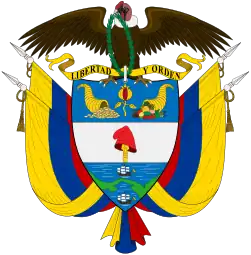 |
The Economist Intelligence Unit rated Colombia a "flawed democracy" in 2022.[1][2]
Constitutional reforms
Colombia's present constitution, enacted on July 5, 1991, strengthened the administration of justice with the provision for introduction of an adversarial system which ultimately is to entirely replace the existing Napoleonic Code. Other significant reforms[3] under the new constitution provide for civil divorce, dual nationality, the election of a vice president, and the election of departmental governors. The constitution expanded citizens' basic rights, including that of "tutela," under which an immediate court action can be requested by individuals feeling that their constitutional rights are being violated and if there is no other legal recourse.
The national government has separate executive, legislative, and judicial branches.
Executive branch
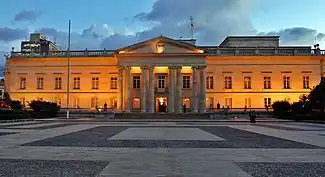
The president is elected for a single four-year term. Between 2005 and 2015, the president could be re-elected for a second term. The 1991 constitution reestablished the position of vice president, who is elected on the same ticket as the president. By law, the vice president will succeed in the event of the president's resignation, illness, or death.
Since 2015, the president is barred from running for reelection, even for a nonconsecutive term.[4]
Legislative branch
Colombia's bicameral Congress consists of a 108-member Senate of Colombia and a 172-member Chamber of Representatives of Colombia. Senators are elected on the basis of a nationwide ballot, while representatives are elected in multi member districts co-located within the 32 national departments. The country's capital is a separate capital district and elects its own representatives. Members may be re-elected indefinitely, and, in contrast to the previous system, there are no alternate congressmen. Congress meets twice a year, and the president has the power to call it into special session when needed.
Political parties and elections
2018 Presidential election
| Party | Candidate | Votes | % | ||
|---|---|---|---|---|---|
| Democratic Center | Iván Duque | 4,044,509 | 67.76% | ||
| Independent |  |
Marta Lucía Ramírez | 1,538,882 | 25.78% | |
| La Patria de Pie |  |
Alejandro Ordóñez | 385,110 | 6.45% | |
| Source: Semana | |||||
Duque won the nomination, and following his victory, he selected the runner-up, Ramírez, to be the alliance's vice presidential nominee.[5]
2018 Legislative Election
Senate
{{#section-h:2018 Colombian par
Chamber of Representatives
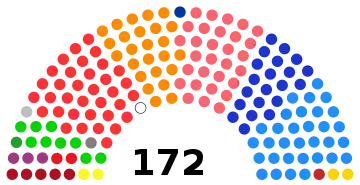 | ||||
|---|---|---|---|---|
| Party | Votes | % | Seats | |
| Colombian Liberal Party | 2,447,298 | 16.53 | 35 | |
| Democratic Center | 2,380,290 | 16.08 | 32 | |
| Radical Change | 2,141,108 | 14.47 | 30 | |
| Social Party of National Unity | 1,824,570 | 12.33 | 25 | |
| Colombian Conservative Party | 1,802,894 | 12.18 | 21 | |
| Green Alliance | 880,354 | 5.95 | 9 | |
| Independent Movement of Absolute Renovation | 576,998 | 3.90 | 1 | |
| Alternative Democratic Pole | 438,283 | 2.96 | 2 | |
| Citizen Option | 307,478 | 2.08 | 2 | |
| List of Decency Coalition (ASI–UP–MAIS) | 260,712 | 1.76 | 2 | |
| Fair and Free Colombia | 191,109 | 1.29 | 1 | |
| AV–PDA | 173,706 | 1.17 | 0 | |
| Partido Somos | 159,967 | 1.08 | 0 | |
| Independent Social Alliance Movement | 109,258 | 0.74 | 0 | |
| Alternative Santandereana Coalition (AV–PDA–ASI) | 70,502 | 0.48 | 1 | |
| List of Decency Coalition (UP–MAIS) | 48,318 | 0.33 | 0 | |
| Indigenous and Social Alternative Movement | 43,776 | 0.30 | 1 | |
| Patriotic Union | 42,114 | 0.28 | 0 | |
| Common Alternative Revolutionary Force | 33,951 | 0.23 | 5 | |
| AV–PDA–UP | 17,732 | 0.12 | 0 | |
| Todos Somos Colombia | 16,271 | 0.11 | 0 | |
| Indigenous Authorities of Colombia | 11,082 | 0.07 | 0 | |
| ASI–AV–UP | 4,902 | 0.03 | 0 | |
| Regional Integration Movement | 3,123 | 0.02 | 0 | |
| Vice-presidential runner-up | 1 | |||
| Vacant[lower-alpha 1] | 1 | |||
| Blank votes | 815,502 | 5.51 | – | |
| Total | 14,801,298 | 100.00 | 169 | |
| Valid votes | 14,801,298 | 86.95 | ||
| Invalid votes | 2,222,411 | 13.05 | ||
| Total votes | 17,023,709 | 100.00 | ||
| Registered voters/turnout | 36,025,318 | 47.25 | ||
| Afro-Colombian seats | ||||
| C.C. Ancestral De Comunidades Negras Playa Renaciente | 32,243 | 8.12 | 1 | |
| Consejo Comunitario La Mamuncia | 25,428 | 6.40 | 1 | |
| C.C. De La Comunidad Negra De La Plata Bahía Málaga | 17,477 | 4.40 | 0 | |
| Consejo Comunitario Del Rio Yurumangui | 14,048 | 3.54 | 0 | |
| C.C. De Comun. Negras Palenque Vda. Las Trescientas Y Mun. Galapa | 13,122 | 3.30 | 0 | |
| Consejo Comunitario Mayor De Certegui | 11,340 | 2.86 | 0 | |
| Consejo Comunitario De Alejandro Duran Diaz | 8,604 | 2.17 | 0 | |
| Todos Somos Colombia | 7,578 | 1.91 | 0 | |
| Corporación Poder Ciudadano | 7,048 | 1.78 | 0 | |
| Consejo Comunitario Renacer Negro | 6,414 | 1.62 | 0 | |
| Consejo Comunitario Bocas Del Atrato Y Leoncito | 4,219 | 1.06 | 0 | |
| Consejo Comunitario Ma Kankamana De San Basilio De Palenque | 4,179 | 1.05 | 0 | |
| C.C. De La Comunidad Negra De La Calle Larga Rio Dagua | 3,539 | 0.89 | 0 | |
| C.C. De Los Corregimientos De San Antonio Y El Castillo | 3,437 | 0.87 | 0 | |
| Consejo Comunitario Los Andes | 3,391 | 0.85 | 0 | |
| C. C. De La Comun. Negra De Tierra Baja Mi Territorio Ancestral | 3,325 | 0.84 | 0 | |
| Consejo Comunitario Veredas Unidas Un Bien Común | 3,201 | 0.81 | 0 | |
| Consejo Comunitario Imbilpi Del Carmen | 2,711 | 0.68 | 0 | |
| Consejo Comunitario De La Comunidad Negra De Limones | 2,618 | 0.66 | 0 | |
| Consejo Comunitario Tablon Salado | 2,225 | 0.56 | 0 | |
| Fund. Afrocolombiana Liberal De Desarrollo Social (Afrocodes) | 2,162 | 0.54 | 0 | |
| Kusuto Magende Cokumalu De Luruaco | 2,136 | 0.54 | 0 | |
| Consejo Comunitario De Las Baras | 1,989 | 0.50 | 0 | |
| Consejo Comunitario De Comunidades Negras Obatala | 1,766 | 0.44 | 0 | |
| Cuenca Del Rio Iscuande | 1,667 | 0.42 | 0 | |
| Org. Social De Comunidades Negras "Nelson Mandela" | 1,619 | 0.41 | 0 | |
| Consejo Comunitario De Comunidades Negras Santo Domingo | 1,505 | 0.38 | 0 | |
| C.C. General Del Río Baudó Y Sus Afluentes "Acaba" | 1,428 | 0.36 | 0 | |
| Blank votes | 206,635 | 52.04 | – | |
| Total | 397,054 | 100.00 | 2 | |
| Indigenous seat | ||||
| Indigenous and Social Alternative Movement | 99,182 | 25.68 | 1 | |
| Indigenous Authorities of Colombia | 45,358 | 11.75 | 0 | |
| ANICOL | 4,409 | 1.14 | 0 | |
| UAIZSACOR | 4,156 | 1.08 | 0 | |
| Taita Zipa Foundation | 2,610 | 0.68 | 0 | |
| Casiyouren Traditional Authority | 1,946 | 0.50 | 0 | |
| Blank votes | 228,488 | 59.17 | – | |
| Total | 386,149 | 100.00 | 1 | |
| Source: MOE, MOE | ||||
- The Raizal seat was not filled.
Judicial branch
The civilian judiciary is a separate and independent branch of government. Guidelines and the general structure for Colombia's administration of justice are set out in Law 270 of March 7, 1996. Colombia's legal system has recently begun to incorporate some elements of an oral, accusatory system. The judicial branch's general structure is composed of four distinct jurisdictions (ordinary, administrative, constitutional, and special). Colombia's highest judicial organs are the Supreme Court, the Council of State, the Constitutional Court, and the Superior Judicial Council. Although all the high courts technically oversee separate jurisdictions, the Constitutional Court has a broad spectrum of judicial oversight which often allows it to rule on issues overseen by different jurisdictions and even weigh in directly in the rulings of other high courts.[6]
International organization participation
Global
Other
References
- "Democracy Index 2022: Frontline democracy and the battle for Ukraine" (PDF). Economist Intelligence Unit. 2023. Retrieved 2023-02-09.
- wola (2020-05-04). "Illegal Surveillance by Colombia's Military is Unacceptable". WOLA. Retrieved 2020-05-10.
- Bruce M. Wilson, "Institutional Reform and Rights Revolutions in Latin America: The Cases of Costa Rica and Colombia", Journal of Politics in Latin America, ISSN 1868-4890
- L, Elizabeth Reyes (4 June 2015). "Colombian lawmakers approve a one-term limit for presidents". EL PAÍS English Edition.
- "2018 Colombian elections: A test for peace?" (PDF). European Parliamentary Research Service. Retrieved 18 September 2022.
- Botero Marino, Botero Marino; Fernando Jaramillo. "El Conflicto de las Cortes Colombianas en Torno a la Tutela Contra Sentencias" (PDF). Retrieved 5 October 2015.
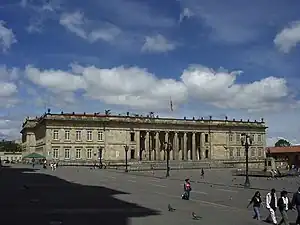
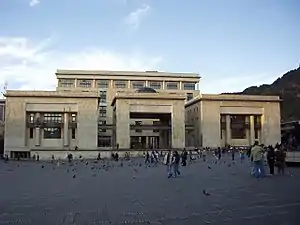
.svg.png.webp)